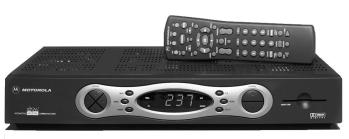Motorola selects Embedix embedded Linux for set-top box
Aug 29, 2001 — by LinuxDevices Staff — from the LinuxDevices Archive — 2 viewsSan Francisco, CA; LinuxWorld — (press release excerpt) — Lineo Inc. today announced that Motorola, Inc. Broadband Communications Sector has selected Lineo's Embedix Digital Media core as the initial Linux operating system software for its target=”_blank”>DCT5000 family of advanced interactive digital set-top terminals. The platform is expected to accelerate the deployment of advanced digital content and applications, including such features as personal video recording, streaming media, and home networking capabilities. The Motorola DCT5000 set-tops with Lineo Embedix Digital Media core are expected to be available in Q1 of 2002.

Motorola's DCT5000 set-top box
Motorola selected the Embedix Digital Media core because the Linux-based software provides a robust feature set and is enhanced with drivers and extensions that allow for advanced digital programming and services while maintaining a small footprint in the set-top. In addition, the Embedix Digital Media open platform enables developers to quickly create and port middleware and applications. The stability and robustness of Embedix Digital Media enables the delivery of an enhanced, interactive digital experience. Lineo Embedix Digital Media contains a Linux kernel that has been optimized and enhanced with graphic drivers, transport stream drivers, and TV and video extensions to meet digital set-top terminal demands.
“The Embedix Digital Media core provides the open and stable operating system software solution needed for our advanced digital set-top platform, while helping to contain development costs,” said Carl McGrath, vice president and general manager of Motorola Broadband's DigiCable business. “The Embedix Digital Media core will provide an expandable development platform for any number of the latest 'in-demand' applications, such as personal video recorders and home networking.”
Bryan Sparks, Lineo CEO said, “Motorola Broadband Communications Sector has deployed more than 16 million digital set-top terminals to date, establishing its leadership in the broadband cable industry. Motorola and Lineo look forward to establishing the DCT5000 with a robust and stable platform as Linux quickly becomes the standard for digital media. Lineo's extensive embedded Linux experience, combined with Motorola's leading set-top hardware and end-to-end cable systems expertise, will provide powerful digital media capabilities for broadband network operators and content providers.”
This announcement closely follows the broadband industry's June 2001 announcement of the formation of the TV Linux Alliance, of which both Motorola and Lineo serve as founding members. As part of the TV Linux Alliance, Lineo and Motorola joined 22 other industry leaders to define a standards-based Linux environment for the digital set-top market.
The Linux environment offers broadband network operators significant benefits, among them lower operating system and development costs, more rapid device driver support for new hardware features, fewer cycles in porting middleware solutions, and easier porting of additional new interactive applications — each of which can help deliver the latest advanced interactive services more quickly and less expensively.
Motorola's DCT5000 family of interactive set-top terminals (including the DCT5100, DCT5200, and DCT52X0) is the most technologically advanced set-top platform available today, offering a thick-client solution for operators to aggressively ward off satellite Digital Broadcast Satellite (DBS) competition. Each member of the DCT5000 family contains a high-end processor, a large memory footprint, an integrated DOCSIS modem, 3D graphics support, HDTV decoding capabilities, and operator-selectable thick-client application suites. These products provide a platform for future IP and video-based interactivity, including personal video recorder (PVR), high-definition TV, streaming media, IP and video telephony, file transfer capability, and session-oriented gaming.
This article was originally published on LinuxDevices.com and has been donated to the open source community by QuinStreet Inc. Please visit LinuxToday.com for up-to-date news and articles about Linux and open source.